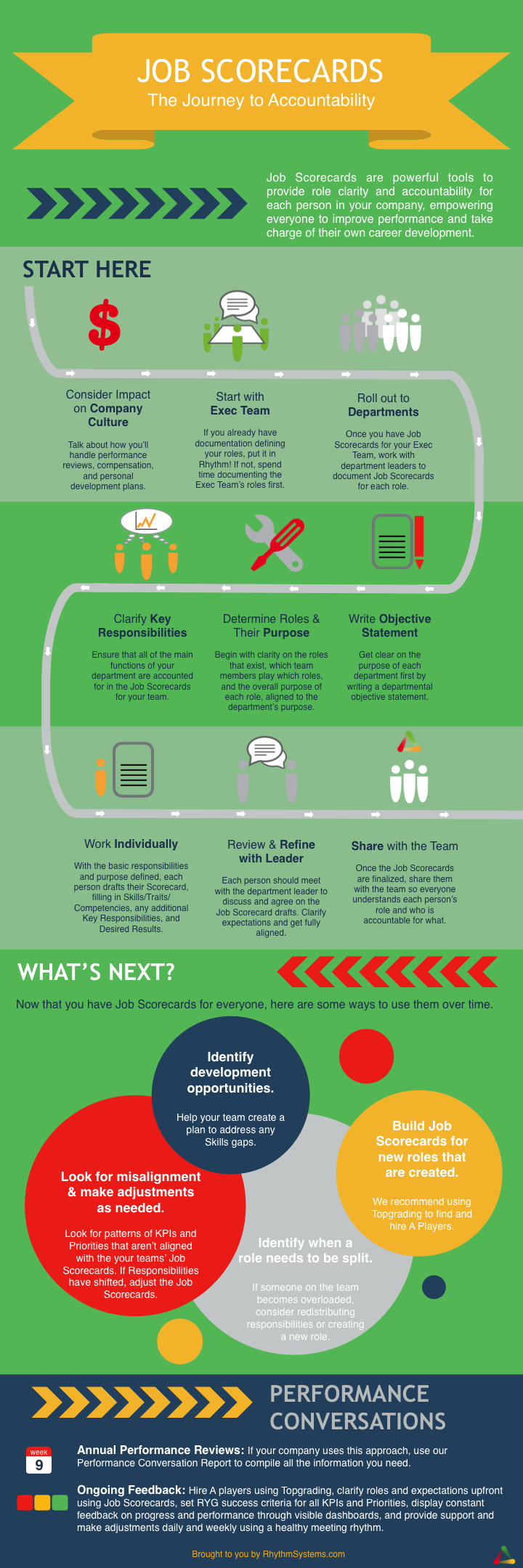Whether you are an executive team member, a department leader, or a member of the team, the role you  play in the company is unique and important. You are there for a reason and you want to be successful. In order to be successful, you have to understand your purpose, what you are responsible for, how success will be measured, the skills you might need to develop, and the values you must uphold. Role clarity is key to your success, and Job Scorecards are a great way to achieve role clarity.
play in the company is unique and important. You are there for a reason and you want to be successful. In order to be successful, you have to understand your purpose, what you are responsible for, how success will be measured, the skills you might need to develop, and the values you must uphold. Role clarity is key to your success, and Job Scorecards are a great way to achieve role clarity.
The process of completing Job Scorecards for everyone in your company is a journey. We recommend you start with the executive team first. But, before you begin filling in the tool, discuss and agree as a team on how Job Scorecards fit in to your overall company culture and strategy. How will you use them? Will they impact how you currently do performance reviews? Will they have any connection to compensation? Will they change how you develop your teams? Once you understand the impact of using Job Scorecards in your company, you can begin working on completing them for everyone at the executive team level. Next, executives can work with their department leaders to complete their Job Scorecards. When working to complete Job Scorecards for all members of a particular department, it can be very helpful to start with an objective statement for the department as a whole; this will help each team member think about the purpose of their role within the department.
Here’s a Step-By-Step Guide for Rolling Out Job Scorecards in Your Company

If you are working on your Job Scorecard independently, create a first draft then schedule time to review and refine it with your department leader. You should continue to collaborate with your leader until you both are 100% aligned and agree on everything listed on your Job Scorecard. There is great value is this discussion, so please take full advantage of this opportunity to clarify and document realistic expectations. Your Job Scorecard is not complete until you and your leader are in 100% agreement.
After that, you own it! You are accountable for your results, your personal development, and the successful completion of your responsibilities. Your leader’s role is to support you, remove roadblocks, and leverage the strengths of everyone on your team to achieve business results. If you use Rhythm software, Rhythm will help you track your progress and measure your success. You will be able to know at all times if you are delivering great results and engage with your team to break through any roadblocks that come up.
With role clarity, you'll be empowered to assess your own performance, own your results, identify personal development needs, and significantly multiply your contributions to the company and to your own success.
The Power of Systems and People: Accountable Leaders and Teams
Use Job Scorecards to Build Team Accountability
Don't Get Stuck on Your Job Scorecard
Use Your Core Values and Job Scorecards in Your Hiring Process
The Staggering Cost of a Mis-Hire: Use Job Scorecards Instead
The 5 C's of Team Accountability
Why Traditional Performance Appraisals Might Be A Big Mistake (And What To Do Instead)
Use Topgrading and Job Scorecards Together to Attract and Retain A Players
Rhythm Systems Employee Engagement Resource Center
Photo Credit: iStock by Getty Images




